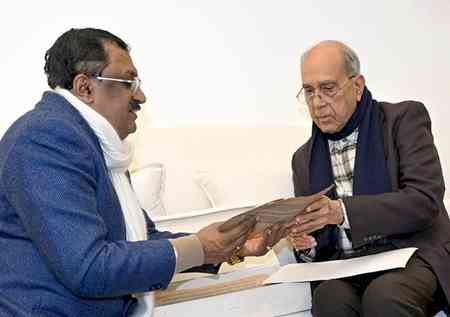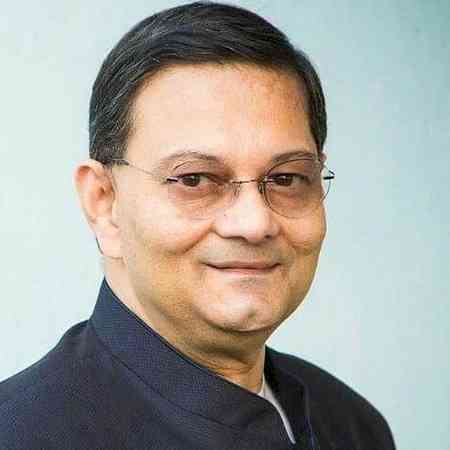Covid had led to severe economic recession says Piyush Gupta of DBS Bank
Engages in a fireside chat on Macroeconomic outlook in TiECON Chennai 2020

Chennai: Engaging in an intriguing conversation about the macroeconomic outlook of amidst a pandemic, Piyush Gupta, CEO & Director of DBS Bank shared his analysis on the road ahead on the third day of TiECON Chennai 2020. The first chat between Piyush Gupta and Puneet Pushkarna, General Partner at Solmark took interesting strides as they deliberated over economic reforms, challenges and opportunities in the near future.
Presenting an insightful talk to over 1000 participants virtually, Piyush shared an assertive outlook on the global economy and the impact of COVID-19. The conversation dwelled deeper into various schools of economic analysis that helped new-age entrepreneurs be wary of challenges that needs to be tackled head-on.
Sharing his views, Piyush Gupta, DBS Bank, said “From the macroeconomic perspective, this is without a doubt the most severe economic recession that we have seen in a long period of time. India at around 24% for the second quarter was extreme. But if you look at the rest of the world, Europe is at 14%, Singapore is at 13%, US is at 9% so everybody is down quite significantly. I think the overall expectation is that the global GDP is going to be down, somewhere between 5.5-6% for this year. In an USD 80 trillion dollar world, 5-6% drop is USD 4-5 trillion dollar of complete destruction on demand and economic activity. So the first take away is that even if you see a bounce back…we will be lucky to regain 2019 levels of economic activity before late 2022 and perhaps 2023. That two or three year loss of complete economic activity is very material.”
He further added, “The second take away with that is that it is not an even problem. It is an uneven problem. It is very uneven by country and partly it is determined by healthcare. The people who have managed to get their hands around the pandemic more quickly, North Asian countries for example, will do better than the others. It is principally driven by the capacity of the countries to be able to throw money at the problem. The richer countries, who have the exorbitant privilege of having reserve currency, can throw a lot more money at the problem to cushion this downfall. Countries which are in more challenging situations, more fiscal current account deficit or higher Debt to GDP or inadequate capacity to borrow throw smaller amounts at the problem. In this case, the ability to cushion the economy and people is going to be limited and it is likely that the recovery period takes longer. It is equally uneven by sectors as well. In some sectors you will see demand come back more quickly. If you are in [the] groceries or supermarket [business] or anyone supplying goods into the digital supply chain or work from home products, you did okay. But the cross border sectors like F&B, Tourism, Travel and Hospitality are going to take a long time to recover.”
Another interesting observation shared by Piyush Gupta in his conversation was, “The [next] part of the problem really depends on the nature and strength of the financial system in different countries. Without a doubt, the real finance sector problems are yet to come. Most countries have been able to cushion SMEs and consumers, only for it to run out in the latter part of this year. At some stage, the governments will have to stop trying to support SMEs and consumers. When that happens, you should expect to see a wave of default. In fact, there will be a tsunami of defaults in the SME sector and consumers. God forbid it doesn’t impact the property market.”
Speaking on the future of the global job market and challenges ahead, Piyush Gupta added, “Job loss in the last six months has been extreme. In countries like US and India it is evident. However in some countries job loss is not visible yet because governments have given money to SMEs to keep them afloat. Many of them are effectively zombie companies which means job loss is being kicked down the road. But my real concern is joblessness or structural job loss. Post 2008-2009, while jobs came back, the structure of jobs has been very different from the pre-2009 period. The bulk of jobs that have made a comeback are freelance jobs, gig economy jobs, entrepreneurial jobs. The nature of large corporations, the ones that caused the Industrial Revolution, has been fundamentally changing over the [last] decade. If you track the wealthy companies in the world in terms of market cap and look at employment base, they don’t employ people. This, to my mind, is going to be a massive problem in the next five years. COVID-19 has taught that you can restructure operations in fundamental ways. Through digitization, and more importantly through data and AI, you are going to be able to do tons more jobs digitally and through technology than before. So the structural nature of unemployment is the [other] thing we need to keep our mind on.”
Presenting a deeper analysis of what the future holds for the global economy on the back of a pandemic, Piyush Gupta further added, “In effect, governments and Central banks have spent more money in the last six months than was spent in the entire 2008-2009 crisis. This is both fiscal (the amount of money governments are raising and borrowing to be able to support individuals, consumers, companies) and also monetary (the easing of monetary policies by central banks). Both of these are at a record. The world has never seen a trend of this nature and size anytime. The impact of this from a macroeconomic prism is uncertain. What it will do is Japanification - pay for this slowly over a period of time with maybe 0.5% or 1% deterioration in your growth rate. [Others] would say effectively it is about the money. It means that inflation has to come. It might not come in the next year or two, with the demand destruction, but if you look three-four years out inflation has to come, curves will steepen and people will pay for it over time.”
Following this lively fire-side chat, a panel discussion diving deep into the subject of agri–tech was conducted. Speaking on the subject of building tech-enabled agri supply chains for global markets were four experienced professionals from the sector – Hari Rajagopal, Vice President of Capital Markets and Strategic Partnerships at Samunnati Financial Intermediation & Services; Sateesh Nukala, CEO & Founder of BigHaat India; and Subhadeep Sanyal, Partner at Omnivore. The conversation was moderated by Hemendra Mathur, Venture Partner of Bharat Innovation Fund.
The final session of the day hosted Sajith Sivanandan, Managing Director and Business Head at Google Pay in conversation with Prem Sivakumaran, Director of Growth Mechanics. They spoke on the decision making within Google Pay.
The Tamil session on Day 3 of TiECON Chennai 2020 also had an interesting fire-side chat between Sridhar Vembu, Founder of Zoho Corporation, and Badri Seshadri, Managing Director at Synprosoft (NHM) traversing through a variety of entrepreneurial topics.


 cityairnews
cityairnews 










